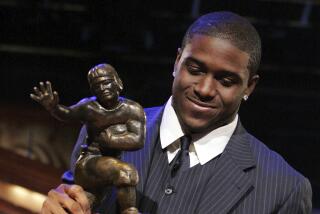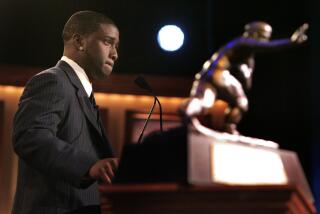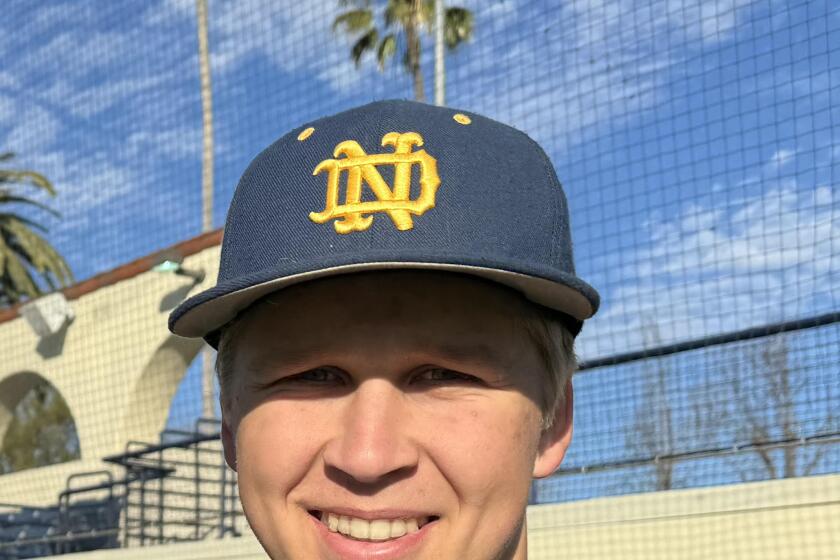Thrashed by Charge of Murder
Pro skateboarder Neil Heddings carved out a reputation based almost as much on the pentagram tattoo on his chest and his rebellious lifestyle as his mastery of backyard pools and plywood half-pipes.
He named his youngest son Budweiser, sported a shaved head and traveled the globe performing for young crowds and earning thousands of dollars a year from skateboard companies to help hawk their newest boards and gear.
That image served him well in West Coast skating circles. Heddings says it worked against him the morning of Nov. 23, 2002, when a San Jacinto police officer walked into a bedroom and found the skater with the lifeless body of his 2-year-old son, Marcus, cradled in his arms.
Three months later, Heddings, 30, and his 25-year-old girlfriend, Christine “Pinky” Rams, were charged with beating the boy to death. They are scheduled to stand trial on first-degree murder charges Feb. 1 in Riverside County.
Heddings blames the boy’s death on an undiagnosed medical condition or neglect by Marcus’ mother in San Diego. An autopsy determined that Marcus sustained nearly a dozen sharp blows to the head, probably with a fist. The injuries were at most 2 days old, and Heddings and Rams were the only adults with Marcus during that time, prosecutors allege.
Yet Heddings’ claims of innocence have drawn support not only from many fellow skateboarders but also from usually cautious corporate America. The Vans skateboard shoe company contributed $1,000 to Heddings’ defense fund, and a former subsidiary of Nike held a fundraiser for him at a Portland, Ore., skate park.
“In no way are we trying to pass judgment on this case or get in the police’s way, but the skateboarding community is in his corner,” said Chris Strain, vice president of marketing for Vans. “The guy needs help.”
For most corporations, supporting an accused child murderer would be unthinkable. But skateboard companies are different. They know that the subculture they market to revels in its fringe, anarchist reputation, said David Carter, a sports business author and instructor at USC’s Marshall School of Business.
“Vans and the others understand the role [Heddings] plays in their critical target market,” Carter said.
Many of Heddings’ supporters call the prosecution a sham, saying police prejudice against skateboarders runs deep.”Neil is one of us,” said Jake Phelps, a friend of Heddings and editor in chief of Thrasher, a skateboarding magazine. “He’s the type who’d kick in your fence to go skate in your empty pool. He chose that path, this beer-swilling, wild life. But you live by that blade and you die by that blade. The pig sees you do something, and he’ll fry you. It’s religious zealotry, man. It’s us versus them.”
Homicide Investigation
Heddings said he found Marcus dead on a Saturday morning on the boy’s homemade bed, a few unpainted two-by-fours cobbled together around a mattress. At least 10 minutes went by before Heddings called 911, prosecutors allege.
San Jacinto police arrived at the sparsely furnished home to find bruises on the boy’s head and body, and started to investigate the death as a homicide.
When questioned, Heddings dropped hints that Marcus’ mother might be responsible. He told police that his son had visited his mother in San Diego four days earlier and had come back lethargic and throwing up.
Rams offered another explanation. She told the officers that Marcus slipped and struck his head while she was giving him a bath the day before his death.
As a precaution, county child protective services was called in to take custody of the two other children in the home: Heddings and Rams’ son, Budweiser, and Rams’ other child by a different father.
“Look, I’m a pro skater. People still draw conclusions when they look at you, and I really believe I was preconceived from the start by police,” Heddings said in a telephone interview from jail. “When they first came into my house, they didn’t look at the toys we had for the kids. They looked at me, and they looked at [Rams] and they said, ‘Take their kids.’ Guilty.”
Rams’ former husband, Ronald Rams, told detectives that on the night before Marcus was found dead, Christine had phoned him in tears saying the kids were “driving her crazy.” He told police that Christine referred to Marcus as an “ugly” child and a “little piece of ... ,” according to court testimony.
Heddings and Rams were arrested together March 3, 2003, and secretly tape-recorded while in the backseat of a patrol car -- a key piece of evidence already used against them in a preliminary hearing.
“Don’t turn on me,” Rams told Heddings.
“You don’t turn on me, I won’t turn on you,” he said.
Both were charged with murder, even though the prosecutor handling the case said he didn’t know which one allegedly delivered the fatal blows.
“They both had a duty to protect that child,” Riverside County Deputy Dist. Atty. Kelly Hansen said. “One person either inflicted the damage or failed miserably to protect Marcus.”
In Portland, Ore., and in Heddings’ nearby hometown of Newberg, hundreds of skateboarders have rallied to defend their jailed comrade, holding fundraisers and mailing in checks that have provided more than $40,000 for his defense fund.
Auto Mowdown, a Watsonville, Calif., skateboard company, is designing a special “Neil Heddings” board with all the proceeds going to his defense, and more fundraisers are in the works.
Last year, a big event was held at the Savier Warehouse in Portland, a skater’s paradise equipped with a large particle-board skating bowl, plywood ramps, half-pipes, metal rails and a live, ear-splitting punk band. The warehouse was owned by the skateboarding shoe company Savier, which was owned by Nike at the time and has since been sold.
“Let’s hear noise for Neil!” Mike Estes, a warehouse manager, roared into a microphone, prompting 200 skaters to pound their boards against the wooden ramps. Estes was raffling boards, T-shirts and a truckload of other donated skateboard gear. “Improve your chances of winning something, and improve Neil’s chances of getting out of jail!”
Dozens of skaters opened their wallets, forking over more than $1,500.
They knew the money was going to help two accused child killers. But many of them, teenagers and parents alike, said they were skeptical of the charges.
“I think this is a prejudged case, and the reason I came here was to support the idea that you are innocent until proven guilty,” said Vic Nogueroa, 40, of Portland, who was with his son. “I know if you don’t have a lot of money, it’s easy to get railroaded in this country’s legal system.”
A Nike corporate official who knows Heddings said Savier held the fundraiser independently of the shoe giant but added that he didn’t object to the event.
“Neil’s a good dude,” the executive said, adding that he did not want to be identified because he did not want to embarrass Nike. Loyalty to Heddings runs deep in Portland. He was a fixture at Burnside skate park, a sketchy collection of concrete bowls and mounds that skateboarders clandestinely built under the Burnside Bridge, paving over an old hobo camp along the Willamette River.
Heddings was a foul-mouthed, beer-loving street punk, his friends say with pride, the very image that skateboard companies use to sell shoes and baggy shorts.
“Neil was not into corporate contests; he was more of a backyard pool, street skater,” said his friend Jason Beaudry of Portland. He partied hard and was once arrested for smacking a man on the head with a skateboard during a fight. His tattoos include a checkerboard pattern on his feet, which was inspired by the pattern on his first Vans skateboard shoes.
Heddings’ friends said it was his image that made him an easy suspect. But Hansen, the prosecutor on the case, said he didn’t care “if the whole world was backing Neil.”
“It’s shallow to think the police arrested these two because of their tattoos,” Hansen said. “When no one else was present when the child was hurt, you have to ask how else could these injuries occur. I wish human beings were better to their children. Unfortunately, some of them just lose it.”
Heddings and Rams have sat in jail since their arrest, unable to pay their $500,000 bail. Their other children remain in the custody of Rams’ mother.
Their defense centers on two explanations for Marcus’ death: that the injuries were inflicted while the boy was staying with Susie Moyer, Marcus’ mother, in San Diego; and that Marcus possibly had a chronic medical condition.
Heddings said from jail that he was convinced Marcus was suffering from a medical condition, such as encephalitis, that could have made him prone to brain injury.
“I don’t know what happened to Marcus, but there were medical problems, and that’s the whole ifs, ands or buts,” Heddings said.
Moyer acknowledged that she didn’t provide the best home for her son. She was living in a cheap motel, had an abusive boyfriend and still was a heavy user of methamphetamine around the time of Marcus’ death.
But she adamantly denies having anything to do with the boy’s death. When Marcus came to San Diego for what would be his final visit, he arrived looking battered and bruised, she said.
“Financially, I didn’t have anything. I could only pay for the [motel] room and to feed him,” Moyer said. “A hospital visit, or an emergency room bill would’ve been a problem.”
Hansen said any attempt to implicate Moyer is a ruse.
The head injuries Marcus suffered were not caused by a fall or an illness, according to court testimony by county forensic pathologist Mark Fajardo. The injuries were caused by severe blows to the head, he said.
Heddings, in a letter to Big Brother skateboard magazine in March 2003, proclaimed his innocence: “I want everyone in the world to know how proud I am of my son; how proud I am to have been his father. I thank the powers that be for the time I got to spend with him,” Heddings wrote in his plea for support.
“I want to let the world know one other thing: Me and my girlfriend didn’t hurt my boy, let alone murder him. We don’t belong in jail and we need to get out of here.”
Early Love of Skating
The Riverside County Jail is far different from the inviting three-bedroom home where Heddings was raised, in the Quaker-founded town of New- berg. The home’s gravel driveway is lined with the Portland area’s signature rosebushes, and yellow and green walnut and apple trees surround the house.
Just before he turned 10, Heddings received a green plastic skateboard as a Christmas present. He tried wrestling, baseball and football, but none held his interest like skating, said his mother, Shirley Bookey of Portland. Heddings left for California the day after high school ended, hoping to join up with the world’s great skaters.
He never competed in ESPN’s X Games or other heavily sponsored, highly promoted national skateboarding events, but his skating skills still brought in enough money to live on.
Heddings earned $30,000 to $50,000 a year over the last decade, according to his mother.
He has performed in competitions and demonstrations in Europe, Asia and Australia as a member of a skate team sponsored by Independent Truck Co. of Santa Cruz. He remains a sponsored rider for Randoms Hardware, a skateboard company in Encinitas that still sells “Heddings” bolts -- decorated with pentagrams.
Although Heddings is a “utility player” and nowhere near the league of skateboard icon Tony Hawk, he has earned a loyal following because of his “hard edge” and anti-establishment attitude, said Vans spokesman Chris Overholser. “He was at his peak when he was arrested, at his best ever,” said Sean Lafferty, a longtime friend from Portland.
Marcus’ mother said her young son was always thrilled to watch his father wow the crowd at one of his favorite San Diego County skateboard parks.
When Moyer was given some of Marcus’ cremated ashes, she went to the park and sprinkled them next to the concrete.
More to Read
Get our high school sports newsletter
Prep Rally is devoted to the SoCal high school sports experience, bringing you scores, stories and a behind-the-scenes look at what makes prep sports so popular.
You may occasionally receive promotional content from the Los Angeles Times.







